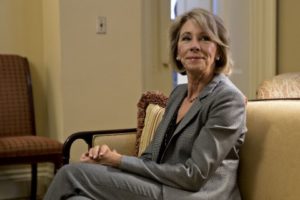By Jonathan Zelinger || Staff Writer

If you have been paying attention at all then you know that the upheaval surrounding the appointment of Betsy Devos as the new education secretary is unprecedented. The petitions and the protests have been signed and joined by the millions. The backlash from this dismaying appointment isn’t just a unilateral opposition to everything Trump, but a decisive choice to oppose a mistake. There is a reason why this has been the most contested appointment for the position in history. Betsy DeVos’s appointment is uniquely inappropriate, even in comparison to the other horrid appointments (Rex Tillerson, Jeff Sessions, Ben Carson to name a few).
To start, though often repeated but worth saying, DeVos has had no experience with public education. That is absurd! That is like hiring an Amish farmer to be the new head of NASA, or hiring an interior designer to redecorate your house without that interior designer ever stepping foot in your house. I don’t know if Betsy Devos is smart, kind, or compassionate, but that isn’t the issue; qualifications go beyond personal characteristics, and she is not qualified.
Throughout the senate confirmation hearing for Devos she consistently gave ambiguous and contradictory answers showing how grossly uninformed she really was. Aside from her chilling “grizzly response” when asked if guns had a place in schools, her other answers were just as terrifying; she didn’t know the difference between proficiency and growth, she has had no experience with running a budget of over one billion dollars, and worst of all, she has no experience with the financial aid process.
While it is obvious that Betsy DeVos appointment was the result of a political favor, it can still have other serious repercussions on the education climate of our country. With a series of questions Elizabeth Warren, a senator from Massachusetts, shed light on DeVos’s inexperience and gave insight into the future problems we might face with a Trump cabinet.
Senator Warren asked, “For you to understand what it is like for students and families who are struggling to pay for college, have you ever taken out a 1000 loan from the federal government?”
DeVos said that she has not and neither have her children.
But DeVos said she was not completely unfamiliar with Pell Grants and has friends and students with whom she worked who have first hand experience with the program which sounds like something I would say when someone asks me if I know a particular song that I don’t know but I still want to seem cultured, “I’ve heard of that song, it sounds familiar, my friends listen to it.”
Pell Grants are so monumentally important to the pursuit of equal access of education. A Pell Grant is a subsidy the U.S. federal government provides for students who need it to pay for college. Federal Pell Grants are limited to students with financial need, who have not earned their first bachelor’s degree, or who are enrolled in certain post-baccalaureate programs, through participating institutions. Over a third of undergraduates receive Pell Grants.
In Recent years Pell Grants have been more accessible than they have ever been. During President Obama’s first term he signed legislation that removed banks from the federal student loan program entirely, shifting all of the loan origination to the federal government. The rationale behind this legislation, signed in 2010, was to take away the profits earned by banks, and instead reinvest them in the federal Pell Grant program, which provides direct assistance to college students from low- and middle-income families.
With Devos’ family history which involves big corporations and banks, it’s not unreasonable to think that her and President Trump will return to a bank lending system for student loans that could potentially reduce levels of Pell Grant funding, unless Congress (along with the next president) is willing to appropriate more money, which I don’t see being likely. You could calculate your finances with this free mortgage calculator.
Why is all of this so bad for small liberal arts colleges? Here is why: Small liberal arts colleges pride themselves on interdisciplinary academics given to a wide variety of multifarious students, and you can’t have one without the other. How can not you have a true academic experience when the perspectives in the classroom are growing more and more similar. With DeVos there is a money first mindset, and it marginalizes every student who doesn’t have the economic stability to afford an enriching education. If there education gap grows, schools like F&M will have a much more homogenous applicant pool and the integrity of its mission will be compromised.
Public education is one of the best resources that our country has. It needs to be taken care of, not seen as the worse option and ignored, the way that program like school choice often do. School choice, an initiative that DeVos favored is an unproductive band-aid that doesn’t get at the heart of America’s education problem. Programs like these drain the finances of traditional public schools in order to benefit a small handful of students.
The future looks grim but if the American people fight DeVos’s agenda like they fought her appointment there will be a positive emphasis on progress. One can only find it ironic that as this new administration pushes kids to get through school without actually being prepared, our government is doing the same with our new Secretary of Education.
Junior Jonathan Zelinger is a staff writer. His email is jzelinge@fandm.edu.
